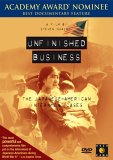| Reviews & Columns |
|
Reviews DVD TV on DVD Blu-ray 4K UHD International DVDs In Theaters Reviews by Studio Video Games Features Collector Series DVDs Easter Egg Database Interviews DVD Talk Radio Feature Articles Columns Anime Talk DVD Savant Horror DVDs The M.O.D. Squad Art House HD Talk Silent DVD
|
DVD Talk Forum |
|
|
| Resources |
|
DVD Price Search Customer Service #'s RCE Info Links |
|
Columns
|
|
|
Unfinished Business (1986)
And it was, without question, purely a racist act, born of a time of racial hysteria. One historian interviewed for the film points to one extreme example, the unsolved murder and decapitation of an Asian in California shortly after Pearl Harbor, a man who turned out to be Chinese. Ultimately, neither German-American nor Italian-American families were shipped to the kind of remote concentration camps that entire Japanese-American communities were. In early 1942, even pacifist Japanese-American civic and religious groups (both Buddhist and Christian) were targeted by the FBI, even as members of these same organizations tried to enlist in the U.S. Armed Forces. In what was described as "a civil liberties disaster," the U.S. Supreme Court ruled that Japanese-Americans "were by nature, disloyal to the United States." This was hardly supported by the facts: during the war, not one single act of espionage was ever committed by a Japanese-American citizen.
Unlike most nisei ("second-generation Americans"), who were extremely reluctant to publicly question their government's orders, Minori Yasui, Gordon Hirabayashi, Fred Korematsu each challenged the system head-on, in highly-publicized if unsuccessful court cases. Forty years later, in the early-1980s, the three argued against the very constitutionality of the internment via a rarely-used writ of coram nobis, allowing for their cases to be reopened.
Unfinished Business is sincerely made and informative, if not especially intimate. Yasui, Hirabayashi, and Korematsu discuss their stories matter-of-factly but somewhat detached from them, with hardly any anger, resentment, or emotion. Director Steven Okazaki never quite breaks through this invisible barrier, though the blunter yet entirely logical support they get from mostly non-Japanese historical and legal scholars (including Roger Daniels) helps some.
Another problem is the film's brevity. It perhaps tries to cover too much ground in too short a time and ends rather abruptly, before any definitive resolution to the men's case.
Instead, the film largely lets the government's own actions speak for themselves, and ultimately works as a filmed record of three genuine American heroes, and for that alone Unfinished Business remains an important work. Minori Yasui died in 1986, shortly after Unfinished Business was released. Gordon Hirabayashi later became professor emeritus in sociology at the University of Alberta and Fred Korematsu was eventually awarded Presidential Medal of Freedom by President Clinton. They died within a month of one another last spring.
The film was nominated for an Academy Award as Best Feature Documentary, but lost to Broken Rainbow, ironically enough a film about another government-decreed "relocation," of 10,000 Navajo Indians in Arizona.
Video & Audio
Unfinished Business is presented in its original full frame format that includes a plug for the Corporation for Public Broadcasting. The image is a bit speckly and digital artifacting here and there, but basically fine, as is the original mono sound. There are no subtitle options.
Extra Features
Outside of a flimsy Filmmaker Biography, the only supplement is a fascinating nine-minute short, Japanese Relocation (1942), produced by the Office of War Information and excerpted in Unfinished Business. The film applauds the government's handling of the euphemistically termed "relocation" the way "a democracy should, with real consideration for the people involved." According to the film, the citizens-turned-prisoners "whole-heartedly" handled the "evacuation" quite "cheerfully." Sure, the barren desert camps in which they were interned were "raw" but "full of opportunity." Tellingly, at no time are barbed-wire fences, armed guards, or watchtowers ever shown.
What's really missing from this DVD, however, is a booklet or onscreen text with historical data on the camps, the three cases, and updates on the lives of Yasui, Hirabayashi, and Korematsu in the years after Unfinished Business was released.
Parting Thoughts
In the wake of similar hysteria following the September 11th attacks, doubtlessly there was some discussion about confining Arab-Americans in much the same way as the government had confined more than 100,000 Japanese-Americans 60 years before. That didn't happen, and Minori Yasui, Gordon Hirabayashi, Fred Korematsu surely deserve some of the credit.
Stuart Galbraith IV is a Kyoto-based film historian whose work includes The Emperor and the Wolf - The Lives and Films of Akira Kurosawa and Toshiro Mifune and Taschen's forthcoming Cinema Nippon. Visit Stuart's Cine Blogarama here.
|
| Popular Reviews |
| Sponsored Links |
|
|
| Sponsored Links |
|
|
| Release List | Reviews | Shop | Newsletter | Forum | DVD Giveaways | Blu-Ray | Advertise |
|
Copyright 2024 DVDTalk.com All Rights Reserved. Legal Info, Privacy Policy, Terms of Use,
Manage Preferences,
Your Privacy Choices | |||||||














